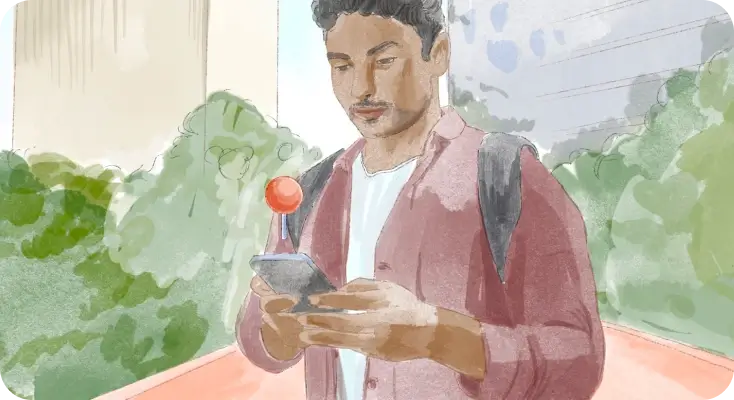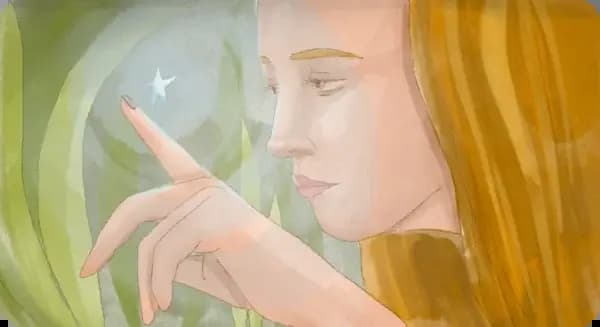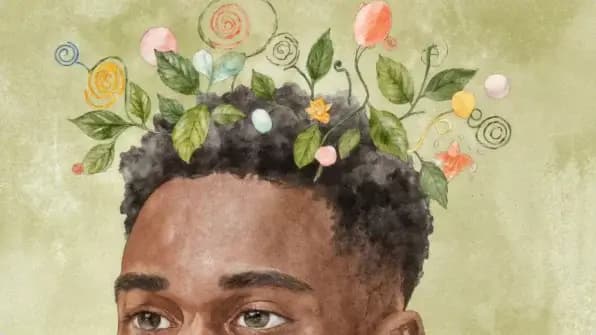Oh, one more day has come to an end… You come home from work completely exhausted and unfulfilled. Sitting on the sofa and watching another dull sitcom, you come up to the thought, “I don’t know what to do with my life.”
This is when the question “How to find myself?” arises. You think about what to do and how to do it, and get no answer. This guide will help you find yourself, provide useful strategies, and prevent common mistakes. Get ready to build a more balanced life, and let’s begin.
But before diving in, start by understanding who you really are. Take the free personality test to get one step closer to finding your true path.
What does it mean to find yourself?
Simply put, finding yourself means discovering your values and goals, life inspirations, and things that make every day more individually meaningful. In other words, it’s a journey of self-discovery when you aim to learn more about yourself at your core without the influence of others’ beliefs distracting you.
When thinking about how to discover themselves, some people might think that once they do this, they’ll start making only the right decisions and will always feel happy. Yet, the truth is that finding yourself is not about perfection or constant happiness. Happiness is a fluid state that comes and goes like the tide of the ocean. It’s more about:
- embracing and accepting your flaws
- having a comprehensive value system
- knowing what drives you and following it
- embracing uncertainty and change as part of the growth process
- learning to trust your intuition and inner wisdom
Still, it’s about happiness as well. Studies show that feelings of ease and comfort in a given situation are tied to feelings of authenticity. [1] Thus, finding out who you are is linked to your level of life satisfaction and overall contentment.
9 ways how to find yourself
“Well, this sounds good,” you might think. Yet, without a clear roadmap, all these talks feel like abstract concepts that are hard to grasp. So, let’s break down the process of finding yourself into practical steps and learn how to take them.
1. Identify your values
First and most importantly, think about what you value most in your life. Choose a quiet evening, make a cup of tea, and take out a favorite notebook. Then, enlist your values. Don’t hesitate to write down anything you want, as this is just for you.
If you feel stuck or find it difficult, here’s a list of the 9 most common people’s values from the World Economic Forum. Check out if some of them resonate with you.
- Family
- Relationships and vulnerability
- Financial security
- Belonging
- Community
- Personal growth
- Loyalty
- Religion/spirituality
- Employment security
- Personal responsibility [2]
Use this list for inspiration, but don’t feel limited to it. You can write down whatever is vital to you. So, how do you find yourself with this list? Once you’ve finished writing the values, number them from the most important to the least important for you. This helps you know what truly matters to you and how you can prioritize life opportunities.
P.S. Your values may point to your personality type: introvert, extrovert, otrovert, ambivert, etc. If you feel comfortable exploring these labels, you can discover surprising things about yourself.
2. Distinguish your wishes from those of others
Many people confuse their dreams, values, and goals with those of others. Developmentally, it’s appropriate to adopt the wants of those who raised us. For instance, your mum has always dreamt of visiting India. So, now you also believe that you want to go there.
But if you’re not into traveling and the only thing you want on the vacation is to stay home, maybe it’s her dream, not yours. It’s a part of differentiating from our families and individualizing to separate our wants from those of others we were raised by.
In fact, this happens very often. So, identifying those separate and individualized wants and finding out who you are takes practice. When making a decision, ask yourself, “Is it really my desire?” or “Do I want it because it sparks me or just because someone else thinks it’s cool?” Maybe you won’t succeed on your first attempt, but later on, you definitely will.
3. Remember what you liked to do in the past
In some cases, children can distinguish their wishes much better than adults. This is just because they don’t keep too many others’ beliefs, expectations, and fears in their heads due to internalized pressures. So, taking a look at what inspired you in your youth may be good grounds to start with.
“How do I find myself again?” you might think. Here are some ideas.
- talk to your parents about what hobbies you had in childhood
- analyze your past dream jobs and why you wanted to acquire them
- read old diaries or take a look at some photos
- think back about what you would like to try but didn’t manage to do so
Of course, in some cases, these may be just childhood dreams. Yet, some of them may give a clue to your authenticity and core self.
4. Think about what fuels your inner fire
Let’s proceed to the present moment. Here are some self-reflection questions you can ask yourself.
- What would I do if I didn’t need to earn money?
- What usually makes me lose track of time?
- When I want to feel happy, what do I focus on?
- What activity makes me feel recharged?
Jot down the answers. You can discover something new on your way to finding yourself.
5. Stay open to new opportunities
You still might think something like, “I don’t know. I don’t want to do anything. Why am I so unmotivated?” Well, the answer may be simple. You haven’t found that spark for your inner fire and curiosity. Definitely, some activities and things might seem unpleasant to you, so you won’t have even the smallest desire to try them. Yet, the world has an enormous number of opportunities that we tend to dismiss if we are stuck in our own lethargy.
The best way to find yourself is to try, make mistakes, and try again. Over and over again. This way, maybe you’ll find out that you love skiing and have an itch to build a career in a big corporation. Or, maybe you’ll learn that family is your top priority, and you want to become a yoga teacher somewhere on the islands. Life can be surprising if you give yourself permission to be curious!

6. Analyze what you avoid
“There are so many things to try.” Yes! But you definitely won’t opt for all of them. If you feel stuck in numerous attempts, it may be helpful to change your perspective. On the way to discovering yourself, enlist what you don’t want to do. This can be anything from living in the same country for your whole life to making a tattoo.
- Is it your thought or taken from others? Maybe your parents believed that having a tattoo is bad, so now you’re simply afraid of them getting angry. (Or, maybe you really don’t want it.)
- What ideas can you get from it? If you don’t want to live in the same country for your whole life, what does it mean? For instance, you may enjoy traveling and in this way try to learn about new cultures. How can you travel more often, and what other ways of learning new cultures can bring you joy? This analysis can bring a lot of thoughts to continue.
7. Overcome your inner critic
What does it mean to find yourself? Quite often, it involves not getting caught up listening to the inner critic and imposter syndrome voices. Usually, this is complex work that involves improving self-esteem and learning to notice your achievements. Save an exercise to start doing what you want without negative feelings.
Challenge your critic’s voice. Next time you hear it in your head, write down the thought and try to analyze it logically. For instance, when the voice says, “You won’t succeed in bachata. Don’t even try,” you can answer something like, “Of course, learning dancing takes time and effort. But usually, this effort pays off.” After some time, this might help you dream broader, try braver, and explore new aspects of your personality to finally find out who you are.
8. Consider what kind of person you want to be
Finding yourself is about your inner feelings and personality traits as well. So, sometimes it may be helpful to pause and think how you would like other people to describe you.
Kind, generous, sincere, adventurous, always smiling, supportive, or, maybe, goal-oriented. Once you know it, you can consider the actions needed to become this kind of person. Analyze what resonates with you and take the first steps to become the best version of yourself.
Interrupting your own negative self-talk is important in order to cultivate room for the positivity to grow. Whenever negative descriptors of yourself interrupt your day, create bridge statements to more neutral descriptors.
9. Get ready to let go
Sorry to say, but sometimes, finding yourself might mean losing some people around you, and finding new ones, by the way!
There may be those who won’t be ready to appreciate and support a new version of you with strong values, boundaries, and desires. Your communication may end, or you might decide to stop it.
You may also decide to give up certain activities, find a new job, or move to another city. Changes can bring some discomfort in the beginning, but remember that you make them on the way to an authentic you. Change is something promised in life, it can be a helpful mindset to lean into acceptance of this versus resistance.
Benefits of finding yourself
We’ve already talked about the fact that a better understanding of yourself leads to a higher sense of fulfillment. Yet, it isn’t the only benefit of regular self-reflection.
- You understand yourself better. Studies state that engaging intentionally in self-reflection can lead to awareness of the values and attitudes, as well as how they impact thinking and behavior. [3] Thus, you won’t longer feel confused about life priorities and next steps.
- You always know what drives you. Even if your battery needs recharging, you can always turn to the things you truly enjoy without thinking and restore inner balance much faster.
- Every action feels purposeful. People who have found themselves making decisions based on what they want and value. This makes them feel aligned and fulfilled.
- You have fewer regrets. When you have a clear roadmap, you won’t probably wake up one day thinking, “Why didn’t I go to Bali 10 years ago?” You live now, even if sometimes it means a need to meet your hesitations.
- You feel happier about your present. Being truly you leads to living a happier and more fulfilling life. Another great day makes you wake up in the morning with pleasure.
“What is the main feeling people experience when they start finding themselves? How can I understand that I’ve found the right road?” Katherine Scott, M.Ed/Ed.S, LMFT, answers, “The main feeling of clarity of beginning to discover your true self can feel like a breath of crisp, delicious air. It can be an arduous journey trudging through the distractions that kept you as a stranger to yourself. However, once that moment of recognition comes, you feel empowered and may I dare say peaceful, as you straighten your crown and breathe a little deeper. The more connected you become with your core self, the lighter you become.”
Questions to ask when looking for the best way to find yourself
We’ve already provided some questions for you to identify what sparks your inner fire. Save some more to understand other aspects of your personality as well.
- What emotions do you experience about your life right now? Why?
- What is your purpose in life?
- How do you see your ideal lifestyle?
- What people inspire you? Why? What aspects of their personality do you value?
- How would you like to see your life in a year?
- If you could describe yourself in one word, what word would it be? Why? Would you like to change it or empower it?
- What aspects of your life frustrate you?
- What role do people around you play in your life?
- What are the main components of your happiness?
- What is the main roadblock for you to fulfill your dreams? How can you overcome it?
Why can finding myself be challenging?
Discovering who you are isn’t linear, and there might be ups and downs. Here’s why you might face roadblocks and how to overcome them.
- You don’t know where to start
- Too many fears are running through your head
- You feel stuck in the routine
- There’s always something hidden deeper
- Others’ expectations have a strong influence on you
Psychology Today suggests 4 ways to overcome roadblocks in your life: expand your perspective, move your body, follow your curiosity, and replace an unproductive habit with a positive alternative. [4]
We can add another point: believe in yourself, don’t give up, and try again. There will always be some challenges, and you will get stronger when you face them.
We asked Katherine Scott, M.Ed/Ed.S, LMFT, to give some more tips to those who want to find themselves but feel stuck at the moment or too exhausted to try again. “At the end of the day, we are our longest companions through life. It can feel so isolating and draining fighting our own inner demons day in and day out. However, you are worth discovering how to be a friend to yourself, and you are worthy of the peace that comes from being grounded in who you are. Create a list of reminders as to ‘why’ it’s vital to your peace to find your true self and have this list accessible. This way, when the going becomes exhausting, you can peek at your ‘whys’, take a deep, centering breath, and keep fighting. You deserve that.”
Sources
- Big Think. “What the science of authenticity says about discovering your true self”
- World Economic Forum. “The world’s most influential values, in one graphic”
- ScienceDirect. “Self-reflection”
- Psychology Today. “Feeling Stuck? 4 Ways to Overcome Roadblocks in Your Life”
Disclaimer
This article is for general informative and self-discovery purposes only. It should not replace expert guidance from professionals.
Any action you take in response to the information in this article, whether directly or indirectly, is solely your responsibility and is done at your own risk. Breeze content team and its mental health experts disclaim any liability, loss, or risk, personal, professional, or otherwise, which may result from the use and/or application of any content.
Always consult your doctor or other certified health practitioner with any medical questions or concerns
Breeze articles exclusively cite trusted sources, such as academic research institutions and medical associations, including research and studies from PubMed, ResearchGate, or similar databases. Examine our subject-matter editors and editorial process to see how we verify facts and maintain the accuracy, reliability, and trustworthiness of our material.
Was this article helpful?







